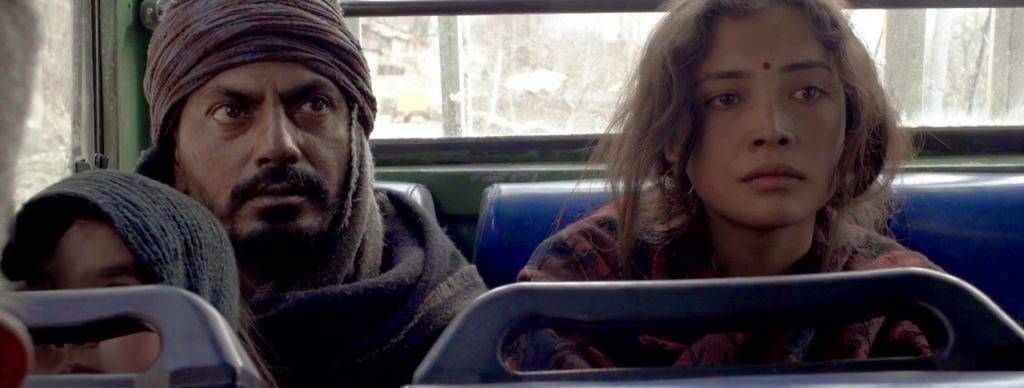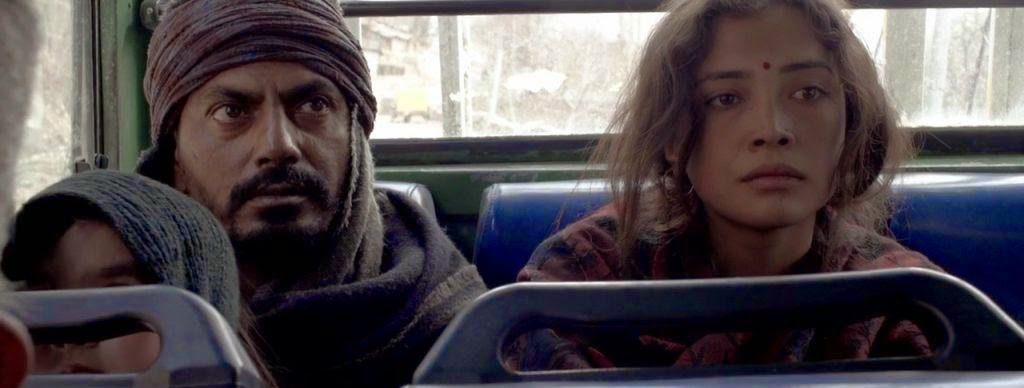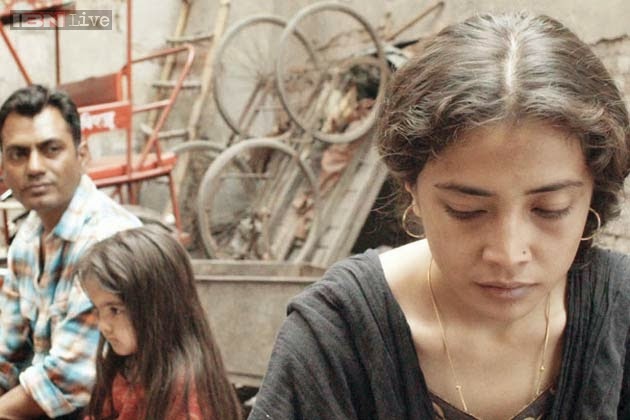Gayathri “Geetu” Mohandas is a talented actor and director from Kerala (she started acting at the tender age of 5 years opposite superstar Mohanlal). She is married to another hot-shot Malayali director (also producer, cinematographer) Rajeev Ravi.
………
…
Geetanjali Thapa is an upcoming Nepali actor from Sikkim. She made her debut with Kamal K.M.’s “I.D.” and won the Best Actor award at the Los Angeles Film Festival as well as the
ImagineIndia International Film Festival. After “I.D.”, she has acted in
“Monsoon Shootout” that premiered at Cannes this year.
…..
…
Director Geetu has struck gold with her second film “Liar’s Dice” in 2013. Li-Di has received two National Film Awards including, Best Actress for Geetanjali and Best Cinematography for Rajeev. It is also selected to be India’s official entry for the Best Foreign Language Film for Oscars (Feb 22, 2015). Incidentally, Pakistan’s Oscar entry is also a superb, women-centered film: Dukhtar, by Aafia Nathaniel.
……..
In a remote village, far away from
Delhi, Kamala fails to hear back from her husband for five months. He is
in the city for work, toiling on the constructions sites that have
become the hallmark of the capital’s expansion. When his cell phone is
quiet for some time and when the village elders ask for more patience,
Kamala sets out to find her husband on her own.
…
Taking her 5-year old
daughter Manya and a lamb along for the long journey, she is a lone
woman on a long trek in an unknown territory. She meets Nawazuddin
(Nawazuddin Siddiqui), an army deserter. They are trapped together in
the only available option of a trip to the city. He is a drifter and she
is focused on a spot in the dark.
…
Nawazuddin and Kamala are both young. The context of their journey
does not allow for romantic interludes. Their culture permits even less.
The distrust among them writes their characters — him a stranger with
rash manners and dubious air and her, a vulnerable woman given less to
trust than to suspicion of a stranger on the road. Telling the truth
comes secondary to them, both impulses drawn from a deep reservoir of a
desire to survive.
….
Nawazuddin is a hustler, for he must be, as he sets
up his game of dice cups anywhere, from a train compartment to a busy
street. Kamla is new to this game of survival. A man’s presence is a
must for her on a journey that is not used to seeing single women in
unfamiliar spaces. She brings a little stash of saved money and
Nawazuddin breaks out his dice cups when he needs a little dough.
…
Mohandas constructs their relationship in layers of cultural
permissibility and situational necessity. Their human warmth is hidden
inside the tough shells of distrust, suspicion and the fear of the
unknown on a road yet to be traveled.
…
At times, the narrative appears
to belong completely to Kamala. As the more vulnerable of the two, with a
young child and a lamb as both responsibilities and emotional cushions,
she is careful, fearful but persistent. She begins the journey wearing
the pristine beauty of the landscape on her face, only to let it
withered away with the brute realities of the conditions away from the
village.
Nawazuddin Siddiqui is a prodigious talent. If for Thapa, it is her
face that becomes the space on which the narrative writes its destiny,
for Siddiqui, it is his body. Limp and weary after an injury and harsh
travel, he is willing to help but on his own terms. He transforms
himself every time he sets up his dice cups, bristling with life as if
he is the instrument and the spectators, mere pawns, the dice that he
plays with. Confident but kind, he expresses as he withholds. When he
stumbles, he learns quickly. With Thapa next to him, we witness a rare
duel of memorable performances.
….
The film moves toward the resolution of finding Kamala’s husband. The
underlying connotation in her husband’s failure to stay in touch with
her is ominous.
…
Thapa, whose fine performance in I.D. won international
awards, plays the courageous if somewhat recklessly irresponsible Kamla,
a lovely lady from the high Himalayas and mother to the precocious
little Manya (Manya Gupta). It’s been five months since
she heard from her husband and she’s worried. He’s stopped writing and
doesn’t answer his cell phone – something’s wrong.
…
Dragging little Manya and, absurdly, her pet goat along, she slips
away in the freezing night and starts down a snowy mountain road. The
little party is almost immediately attacked by two passing truck drivers
and Kamla would almost certainly be raped, were it not for the prompt
intervention of a straggly-looking guy who intervenes.
…
This is Nawazuddin (Siddiqui, who played Faizal Khan in Gangs of Wasseypur and more recently charmed in a supporting role in The Lunchbox.)
He’s virtually unrecognizable with a dirty face and a rag around his
head, looking like a generic freedom fighter who sews up his own wounds
with a borrowed needle and thread.
…
There are just too few cues (outside
the press book) to realize he’s an army deserter from the Border Guard,
and for most non-Indian viewers he will pass as some eccentric outcast
of society. As long as he’s gruff and silent, he seems like a strong
protector for the two women; but when he finds his voice a few scenes
along, surprise: it’s to whine for money. Kamla shows no desire for his
company at all, but without him they can’t sneak their little goat on a
bus that takes them to the regional capital of Shimla.
…
Not much is seen of this exotic location, apart from a scary
night-time scene in which Kamla meets a woman from her village who
evasively refuses to give her info. Sensing a trap, she backs out and
agrees to give their “protector” her gold bangle if he’ll accompany them
to Delhi and check around the construction sites.
…
The talented actors – including wide-eyed, outgoing little Manya –
are interesting to watch as they struggle with their characters. Kamla
however seems too focused on her quest, to the point of sometimes
forgetting the young child at her side who she dragged into danger, and
her inability to accept the inevitable makes her seem a bit soft-headed.
…
Rajeev Ravi’s sensitive cinematography smooths out
the rough edges and highlights the film’s transition from the pristine
snowy village with its steep streets to the urban squalor of Delhi’s
alleyways. John Bosters’ music is soulful and low-key.
Venue: Mumbai Film Festival (India Gold), May 18, 2013.
Production companies: Jar Pictures in association with Unplugged
Cast: Nawazuddin Siddiqui, Geetanjali Thapa, Manya Gupta
Director: Geetu MohandasScreenwriter: Geeta Mohandas
Producers: Alan McAlex, Ajay G. RAi
Director of photography: Rajeev Favi
Production designer: Prakash Moorthy
Editor: B. Ajithkumar
Music: John Bosters
No rating, 104 minutes.
….
Link (1): hollywoodreporter.com/liars-dice
Link (2): dearcinema.com/liars-dice
….
regards


